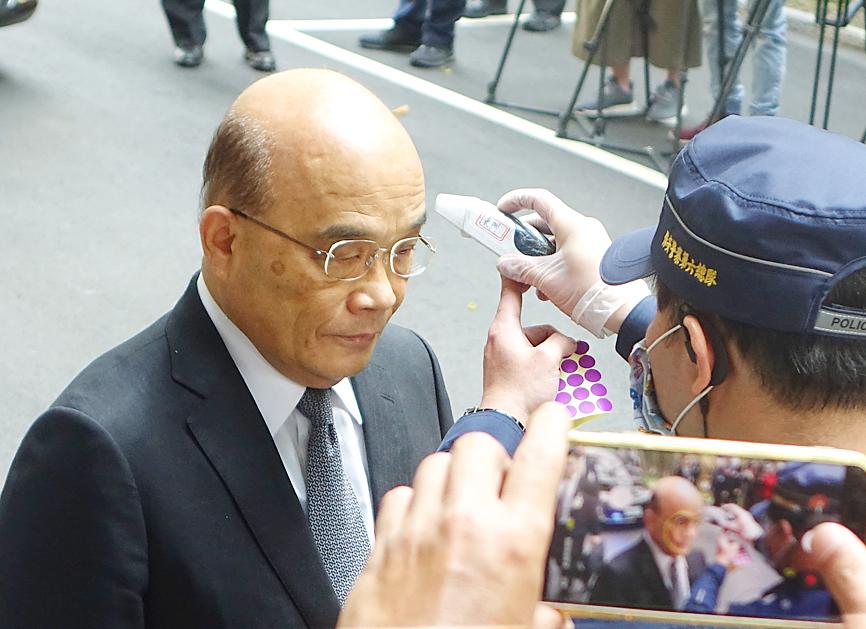Premier Su Tseng-chang (蘇貞昌) yesterday said he would not replace Minister of Health and Welfare Chen Shih-chung (陳時中) as head of the Central Epidemic Command Center (CECC).
Former Chinese Nationalist Party (KMT) legislator Apollo Chen (陳學聖) last week called for Chen Shih-chung to be replaced, citing the contracting economy and panic buying of daily necessities amid the COVID-19 pandemic.
The Taiwan People’s Party this week urged Su to take over the reins at the CECC himself, saying that there were contradictions between how Su and Chen Shih-chung viewed plans to evacuate Taiwanese stranded in Wuhan, China, where the disease emerged.

Photo: Wang Yi-sung, Taipei Times
Chen Shih-chung “is very professional and responsible, and he has done a great job,” Su told reporters at the Legislative Yuan in Taipei. “He will not be replaced.”
He has performed admirably “on the front line” while commanding work to contain the novel coronavirus, while behind the scenes, a large team has worked seamlessly to perform tasks from delivery and distribution of masks to drafting economic stimulus policies, Su said.
Chen Shih-chung’s approval rating reflects public approval of the overall team, Su said.
Asked about complaints by Taiwanese in China’s Hubei Province that two flights to evacuate people via Shanghai Pudong International Airport are “inconvenient” and “expensive,” with the airport more than 1,000km from Hubei, Su said that the airfare was agreed on by the organizing agencies and China Airlines to ease the financial burden people seeking to return home.
As for the Hubei Provincial Taiwan Affairs Office’s call for Taiwanese to be allowed to board homebound flights in Wuhan, rather than Shanghai, Su said that it could be an option after the Chinese government lifts the lockdown on the city.

The manufacture of the remaining 28 M1A2T Abrams tanks Taiwan purchased from the US has recently been completed, and they are expected to be delivered within the next one to two months, a source said yesterday. The Ministry of National Defense is arranging cargo ships to transport the tanks to Taiwan as soon as possible, said the source, who is familiar with the matter. The estimated arrival time ranges from late this month to early next month, the source said. The 28 Abrams tanks make up the third and final batch of a total of 108 tanks, valued at about NT$40.5 billion

Two Taiwanese prosecutors were questioned by Chinese security personnel at their hotel during a trip to China’s Henan Province this month, the Mainland Affairs Council (MAC) said yesterday. The officers had personal information on the prosecutors, including “when they were assigned to their posts, their work locations and job titles,” MAC Deputy Minister and spokesman Liang Wen-chieh (梁文傑) said. On top of asking about their agencies and positions, the officers also questioned the prosecutors about the Cross-Strait Joint Crime-Fighting and Judicial Mutual Assistance Agreement, a pact that serves as the framework for Taiwan-China cooperation on combating crime and providing judicial assistance, Liang

A group from the Taiwanese Designers in Australia association yesterday represented Taiwan at the Midsumma Pride March in Melbourne. The march, held in the St. Kilda suburb, is the city’s largest LGBTQIA+ parade and the flagship event of the annual Midsumma Festival. It attracted more than 45,000 spectators who supported the 400 groups and 10,000 marchers that participated this year, the association said. Taiwanese Designers said they organized a team to march for Taiwan this year, joining politicians, government agencies, professionals and community organizations in showing support for LGBTQIA+ people and diverse communities. As the first country in Asia to legalize same-sex

MOTIVES QUESTIONED The PLA considers Xi’s policies toward Taiwan to be driven by personal considerations rather than military assessment, the Epoch Times reports Chinese President Xi Jinping’s (習近平) latest purge of the Chinese People’s Liberation Army (PLA) leadership might have been prompted by the military’s opposition to plans of invading Taiwan, the Epoch Times said. The Chinese military opposes waging war against Taiwan by a large consensus, putting it at odds with Xi’s vision, the Falun Gong-affiliated daily said in a report on Thursday, citing anonymous sources with insight into the PLA’s inner workings. The opposition is not the opinion of a few generals, but a widely shared view among the PLA cadre, the Epoch Times cited them as saying. “Chinese forces know full well that